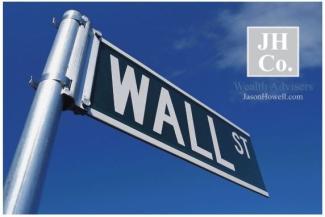
ECONOMIC COMMENTARY (07-08-2020)
Please enjoy our ECONOMIC COMMENTARY along with FAMILY GOVERNANCE & WEALTH MANAGEMENT strategies that we share monthly with our clients.
I. ECONOMIC COMMENTARY
- June 8, 10:31 am EST. The disconnect between the “real economy” and the stock market is real. Last month I articulated 3 reasons why that is sometimes the case:
- It is a reflection of future economic expectations
- It is not a reflection of what’s happening in the current economy
- It sometimes makes no sense
This month I wanted to go a little deeper. When people say the “market is up,” they’re typically referring to one of two stork market indices: the Dow Jones Industrial Average (DOW or DJIA) or the Standard &  Poor’s 500 (S&P or S&P 500). Each of these indices measure the stock market differently. The DOW is a measure of the 30 largest companies listed on US stock exchanges (like the New York Stock Exchange for example). The stock price of each of those 30 largest companies is divided by a “factor’ that equalizes stock activity and equates to the "average" reported number; which was 25,890 on July 7th, 2020. Though the DOW itself is down about 9% for the year, even that negative return doesn’t reflect the true damage felt by the economy. This is in part because Apple, Inc. alone represents over 9% of the value of the DOW and AAPL is up over 25% this year. In fact, the top 4 companies in the DOW represent 30% of the overall 25,890 “average.” If those 4 companies do well (which they have), the other 26 companies of the average look better than they should.
Poor’s 500 (S&P or S&P 500). Each of these indices measure the stock market differently. The DOW is a measure of the 30 largest companies listed on US stock exchanges (like the New York Stock Exchange for example). The stock price of each of those 30 largest companies is divided by a “factor’ that equalizes stock activity and equates to the "average" reported number; which was 25,890 on July 7th, 2020. Though the DOW itself is down about 9% for the year, even that negative return doesn’t reflect the true damage felt by the economy. This is in part because Apple, Inc. alone represents over 9% of the value of the DOW and AAPL is up over 25% this year. In fact, the top 4 companies in the DOW represent 30% of the overall 25,890 “average.” If those 4 companies do well (which they have), the other 26 companies of the average look better than they should.
This distorted view of the stock market is replicated with the S&P 500 index; which ended at 3,145 on July 7, 2020. This average is calculated as a “capitalization weighted” index. This means that the value assigned to each company component is weighted proportionally, unlike the "price weighting" of the DOW. The result is that the top 10 companies (of the 500) typically account for about 27% of the entire index average (3,145). Of these top companies in the S&P, 5 of them are Microsoft, Apple, Amazon, Alphabet (Google), and Facebook. There’s an acronym for 4 of these 5 stocks called “FAANG.” As the “FAANG” stocks go, so goes the entire index and our perception of “the market.”
Neither the DOW nor the S&P 500 are “up” for the year; which makes sense because of the persistent coronavirus health crisis. But they aren’t down as much as they should be. This is in part because 5 to 10 companies in each of those indices account for about 30% of the number. They mostly happen to be technology related stocks at a time when tech is needed the most. Therein lies your real economy/stock market disconnect.
II. FAMILY GOVERNANCE
- Halfway through the year and we’re all still trying to figure out what to do with 2020. One of the things that help guide our clients – who have been through the process – is developing a family constitution that highlights your family values and emphasize your family rules around money. Should you donate? Should you send your kid to camp/daycare/school in the Fall? What does it mean to be charitable? What does it mean to be anti-racist? And how do those values connect you to your ancestors and the legacy you are building for your future? Let’s figure that out together.
Jason J. Howell, CFP® is a former U.S. Congressional Candidate and in 2019 was listed as a TOP WEALTH ADVISER by WASHINGTONIAN magazine. Jason Howell Company is an independent, family wealth management firm run by two owners who consider it their family business. Jason J. Howell, CFP® and Douglas W. Tees, MBA, CFP® are both married to patient wives and are dedicated to their kids. They have built a firm with a great reputation located just outside of the nation's capital in Washington, DC. (Northern Virginia). They hope to honorably serve their growing family of clients for decades.
To book an introductory call, click this link to choose a day/time: Free Consultation

